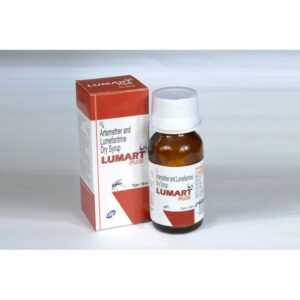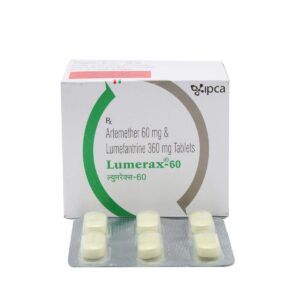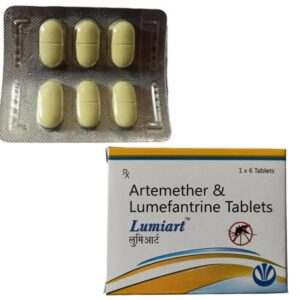ARTEMETHER + LUMEFANTRINE
Artemether: Artemether is an antimalarial drug used for the treatment of malaria. It belongs to the artemisinin class of drugs and is specifically used for the treatment of uncomplicated malaria caused by Plasmodium falciparum.
The mechanism of action of Artemether involves the production of free radicals by the drug when it comes in contact with parasites. These free radicals damage the parasites’ cellular proteins, lipids, and DNA, ultimately leading to their death.
The standard recommended dose of Artemether for adults and children weighing over 35kg is 80mg, followed by a 40mg dose after 8 hours, and then subsequent daily doses of 40mg for a total treatment duration of 3 days. For children weighing less than 35kg, the dose is adjusted based on weight.
Common side effects of Artemether may include nausea, vomiting, abdominal pain, dizziness, headache, and loss of appetite. Other less common side effects can include diarrhea, weakness, muscle pain, cough, and low blood pressure. If any severe side effects occur, such as chest pain, palpitations, difficulty breathing, or signs of an allergic reaction, immediate medical attention should be sought.
It is important to note that Artemether should only be used under the supervision of a healthcare professional and in line with the recommended dosing guidelines to ensure optimal effectiveness and minimize the risk of side effects.
Lumefantrine: Lumefantrine is a medication used for the treatment of malaria. It is typically taken in combination with another antimalarial drug called Artemether, to improve its effectiveness.
The mechanism of action of Lumefantrine involves inhibiting the growth and reproduction of the malaria parasites (Plasmodium falciparum and Plasmodium vivax) in the body. It works by interfering with the enzymes involved in the production of heme, a crucial component for the survival of the parasites.
The usual dose of Lumefantrine depends on the patient’s age and weight, and it is typically taken orally. The medication is usually prescribed as a fixed-dose combination tablet with Artemether, and the treatment course typically lasts for 3 days. It is important to follow the prescribed dosing instructions carefully and complete the full course of treatment to ensure the complete eradication of the malaria parasites.
As with any medication, Lumefantrine can cause side effects. Common side effects include headache, dizziness, upset stomach, vomiting, diarrhea, and rash. These side effects are generally mild and go away on their own. However, if any severe or persistent side effects occur, it is important to seek medical attention immediately.
It is essential to note that Lumefantrine can interact with certain medications, including antacids, rifampicin, and certain anticonvulsants, so it is important to inform your healthcare provider about any other medications you are taking before starting Lumefantrine treatment.
Lumefantrine is an effective and widely used drug for the treatment of malaria, but it should only be used under medical supervision and as prescribed by a healthcare professional. It is not recommended for use as a preventive measure for malaria.



